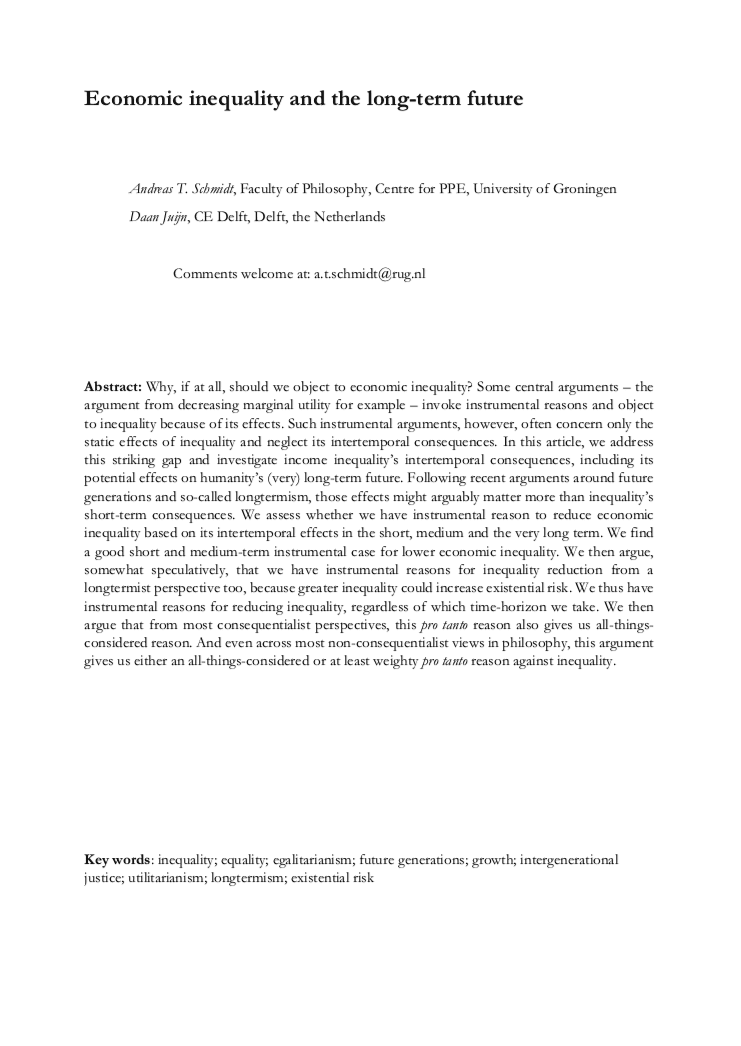Economic inequality and the long-term future
Andreas T. Schmidt (University of Groningen) and Daan Juijn (CE Delft)
GPI Working Paper No. 4-2021, published in Politics, Philosophy & Economics
Why, if at all, should we object to economic inequality? Some central arguments – the argument from decreasing marginal utility for example – invoke instrumental reasons and object to inequality because of its effects. Such instrumental arguments, however, often concern only the static effects of inequality and neglect its intertemporal consequences. In this article, we address this striking gap and investigate income inequality’s intertemporal consequences, including its potential effects on humanity’s (very) long-term future. Following recent arguments around future generations and so-called longtermism, those effects might arguably matter more than inequality’s short-term consequences. We assess whether we have instrumental reason to reduce economic inequality based on its intertemporal effects in the short, medium and the very long term. We find a good short and medium-term instrumental case for lower economic inequality. We then argue, somewhat speculatively, that we have instrumental reasons for inequality reduction from a longtermist perspective too, because greater inequality could increase existential risk. We thus have instrumental reasons for reducing inequality, regardless of which time-horizon we take. We then argue that from most consequentialist perspectives, this pro tanto reason also gives us all-things-considered reason. And even across most non-consequentialist views in philosophy, this argument gives us either an all-things-considered or at least weighty pro tanto reason against inequality.
Other working papers
Staking our future: deontic long-termism and the non-identity problem – Andreas Mogensen (Global Priorities Institute, Oxford University)
Greaves and MacAskill argue for axiological longtermism, according to which, in a wide class of decision contexts, the option that is ex ante best is the option that corresponds to the best lottery over histories from t onwards, where t is some date far in the future. They suggest that a stakes-sensitivity argument…
Tough enough? Robust satisficing as a decision norm for long-term policy analysis – Andreas Mogensen and David Thorstad (Global Priorities Institute, Oxford University)
This paper aims to open a dialogue between philosophers working in decision theory and operations researchers and engineers whose research addresses the topic of decision making under deep uncertainty. Specifically, we assess the recommendation to follow a norm of robust satisficing when making decisions under deep uncertainty in the context of decision analyses that rely on the tools of Robust Decision Making developed by Robert Lempert and colleagues at RAND …
Can an evidentialist be risk-averse? – Hayden Wilkinson (Global Priorities Institute, University of Oxford)
Two key questions of normative decision theory are: 1) whether the probabilities relevant to decision theory are evidential or causal; and 2) whether agents should be risk-neutral, and so maximise the expected value of the outcome, or instead risk-averse (or otherwise sensitive to risk). These questions are typically thought to be independent – that our answer to one bears little on our answer to the other. …

